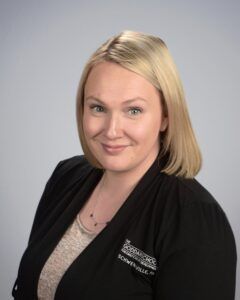BY McCormick Center Staff | December 21, 2023
The Paula Jorde Bloom Scholarship, first awarded in 2019, is intended to support emerging and aspiring early childhood leaders dedicated to providing the highest quality care and education for children and families. The scholarship, established by Paula’s family after she passed in 2018, highlights her legendary devotion to improving early childhood professional standards. We extend congratulations to our 2024 scholarship winner, Brittany Constable.

Brittany Constable
Brittany Constable is the Assistant Director at The Goddard School in Schwenksville, Pennsylvania. She has worked at her school and in the early childhood education field for 12 years, starting as a teacher’s aide. She has an associate degree in Child Development in the preschool setting, and she recently earned her National Director Credential from the McCormick Center. Brittany lives in Downingtown, Pennsylvania, with her husband, Chad, and her two sons, Cain and Case.
“I am most looking forward to connecting with other educators from all over the country. I feel as though I personally get more inspired and motivated when I am around other educators and get to learn from their personal experiences. One of my greatest beliefs is that the foundation of education is relationships. We all learn and grow when we form trusting relationships with others. I feel so blessed to be able to learn from such experienced and knowledgeable presenters and look forward to many of the workshops focusing on inclusion and diversity as a leader.
Being in a leadership position, we spend so much time investing into the professional development of the teachers we lead, that sometimes, we forget about investing into our own professional development. Being able to attend a national conference such as Leadership Connections is such an honor to begin with, but I am excited to take the time and invest in my own growth and into becoming a better leader for my teachers and school community. I cannot wait for February and to see everyone in Wheeling!” – Brittany Constable
As the scholarship recipient, Brittany was awarded complimentary full-conference registration to Leadership Connections 2024, meals provided to conference registrants, and lodging at the conference hotel.
Learn more and register today for Leadership Connections 2024, “Mission Possible: Reconnect, Reignite, Reimagine.”





